One Year Later: New Jersey’s Largest Dairy Rebuilds After Being Leveled by Hurricane Ida
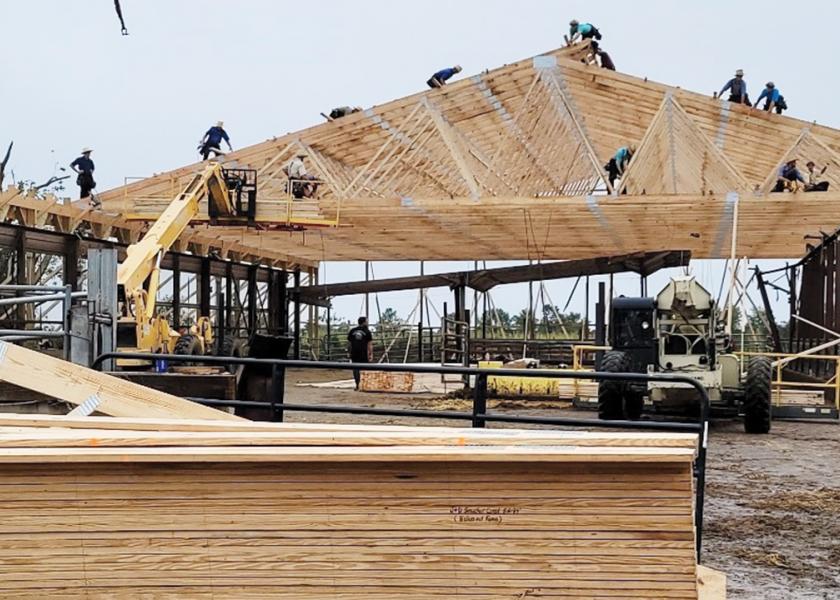
On September 1, 2021, cows were being milked and corn had just started getting chopped at Wellacrest Farms, the largest dairy in New Jersey. Around 6 p.m. that evening, as the cows were standing in line waiting their turn to get milked, a tornado touch down in Mullica Hills.
For three generations, Wellacrest Farms, owned by the Eachus family, has been in operation. The farm is home to 600 cows and an equal number of replacements. However, in 60 seconds a tornado spawned from the remnants of Hurricane Ida and completely devasted the family farm.
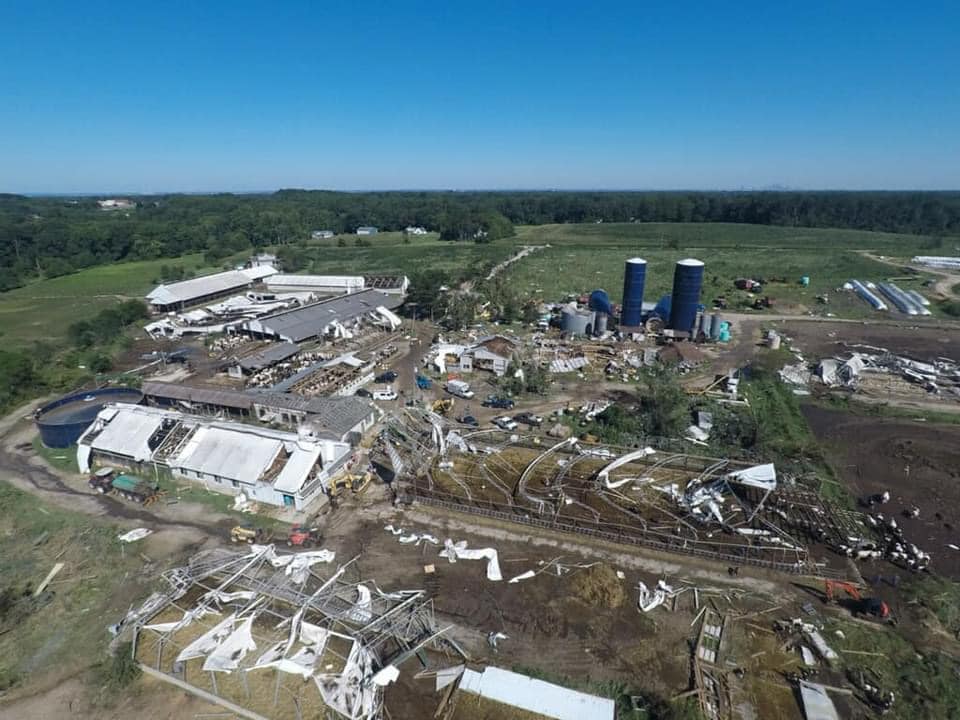
The Eachus family, who had all taken cover, walked out, shocked by the overwhelming destruction, and somehow through the grace of God, they were able to put one foot in front of the other and went to work.
Their chopper was wrecked, as was other equipment. Debris was all over. Cows were crying. Steel was ripped off barns, including their double-14 parallel parlor, but the actual milking units and wiring still were intact.
“It’s a miracle,” Marianne Eachus says.
A local company brought a generator, helping restore partial power and milking started back up around 1 a.m.
The cows were exhausted and so was the family, but once the generator restored power, the cows came through the parlor, one by one, until they were all milked.
“Everybody continued to get milked, fed and watered and taken care of,” Marianne says.
Earlier that day, Marianne’s husband and son headed to the field and began chopping corn. Only two loads were completed before the tornado came through.
“We didn’t get back to chopping until almost a month later,” Marianne says. “Everything was pushed back.”
A domino of pushbacks continued to this day.
“We had a later wheat crop and we had to hire someone to come and spray because our sprayer got demolished,” she says.
Supply chain headaches delayed getting equipment relocated and made finding supplies to rebuild a challenge. Marianne says that she and her family were already exhausted before the tornado ripped through.
“We had just come off of COVID-19, and thankfully we didn’t have to dump milk, but we were only getting paid for 85% of our milk,” she says. “We had two years of struggling and we had talked about downsizing.”
In addition to milking 600 cows, the Eachus family farms 2,000 acres of crops and owns a 500-acre hay farm in New York, along with custom farming.
“We’re very diversified and truthfully, that’s the only reason our farm made it through the pandemic,” Marianne says.
The Adrenaline Effect
When the sun peaked up the following morning, true devastation was revealed.
“We knew that cows were hurt, and my husband and I embraced, cried and then were like, ‘Where do we start?’” Marianne says.
The thought of rebuilding was so overwhelming, as it wasn’t like they just needed a roof and windows; 90% of the buildings were completely gone.
The farm was purchased in 1943 by Marianne’s husband, Ward’s family. The family milked cows and delivered milk from doorstep to doorstep. Ward is one of eight kids and many of his siblings have their own farms.
“Dairy is in our blood. My kids grew up here. My grandchildren are being raised here now,” Marianne says.
Donations began pouring in. People were walking down the lane to offer a lending hand or a case of water. A GoFundMe account raised more than $120,000, which later the Eachus family used to help rebuild their heifer barn.
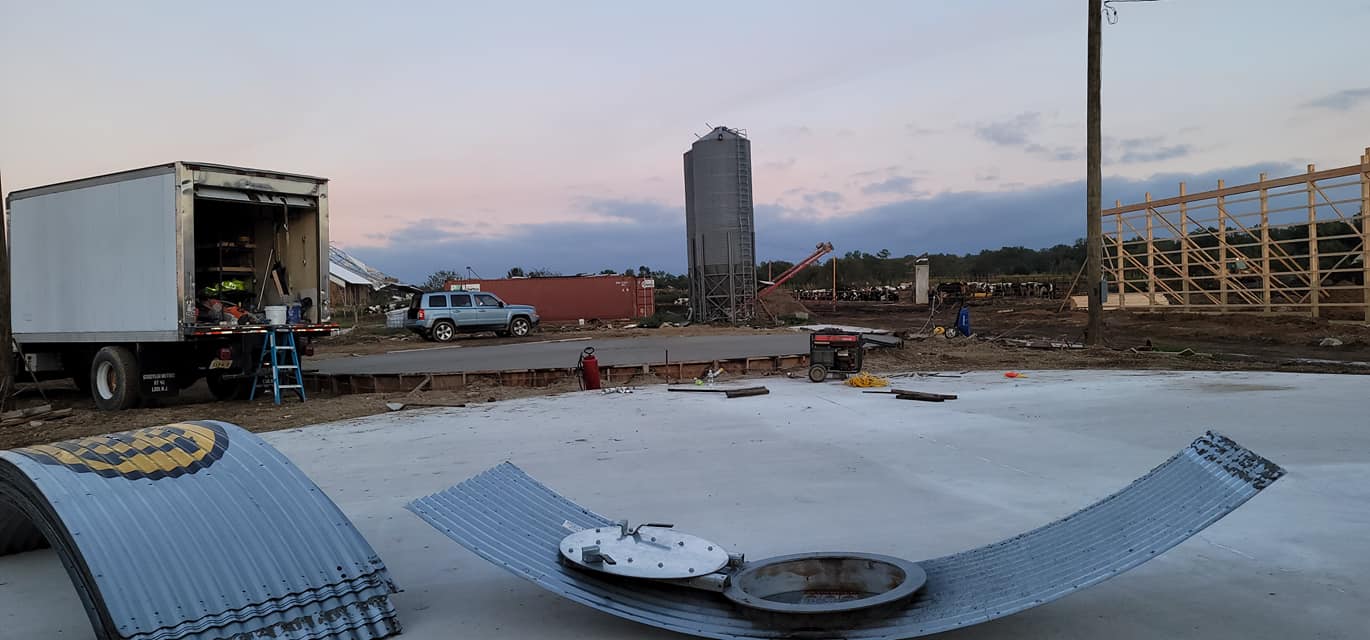
“The outpour of help was overwhelming,” Marianne says.
In addition to food and water, big equipment, like excavators came in and more people, all willing to roll up their sleeves and help pick up the debris, came down the driveway.
Marianne says that she looked to her husband and said, “We have to move forward now.”
Learning that the largest dairy in New Jersey had been hit by a F1 tornado drew waves of people in.
“The outpour of help redeemed my faith in humanity,” Marianne says.
Still emotional talking about what unfolded more than a year ago, Marianne says the devastation that hit the family farm was like a death in the family.
“We hold onto all the great memories and somehow just move forward,” she says.
The total loss is estimated at $2 million, although the Eachus family is still battling with insurance companies today.
“It all had been an emotional financial struggle,” she says.
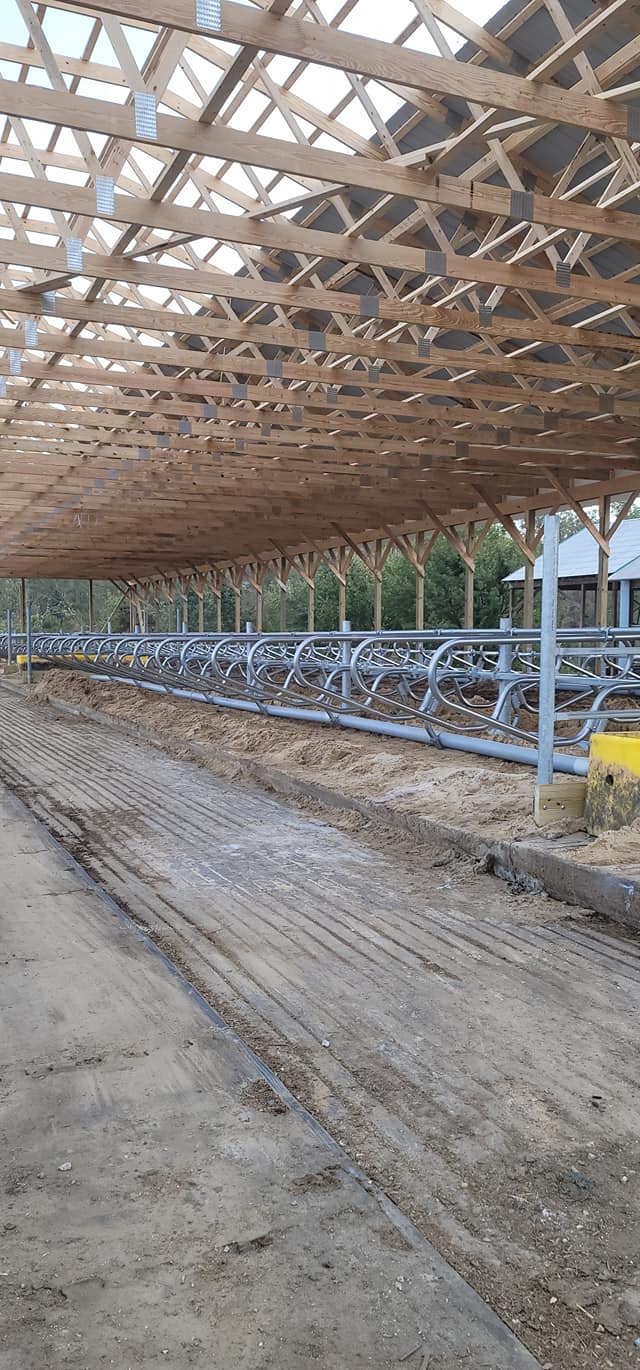
Community Support
The community support was widespread. Local restaurants donated food to ensure the family and all their employees were fed.
A few days after the tornado came through, a couple of Amish men stopped in and offered to volunteer their time to help with the rebuilding process. From a metal roof to hammering 2 x 4’s, installing windows, whatever they could do to help, they did. What they wouldn’t do was except pay. The only payment they would accept is having a meal provided. Which the local restaurants and families made sure the entire work crew – family, employees and those volunteering, including the Amish, were fed, day in and day-out.
“If I had to pay all that labor, I know we wouldn’t have been able to rebuild half of what we did,” Marianne says.
As promised, for 10 weeks the Amish work crew showed up, rolled up their sleeves and worked. Somedays it was a handful, other days, nearly 25. Their ages ranged from 14 to gentlemen in their 70s.
“What one crew started, the next crew came in and just started up where they left off,” Marianne says. “They were amazing help.”
The destruction was massive. Four harvesters were blown down. 45 cows died. And, so much more. Harvest continued until December. Their combine was destroyed, and the fields were covered with debris.
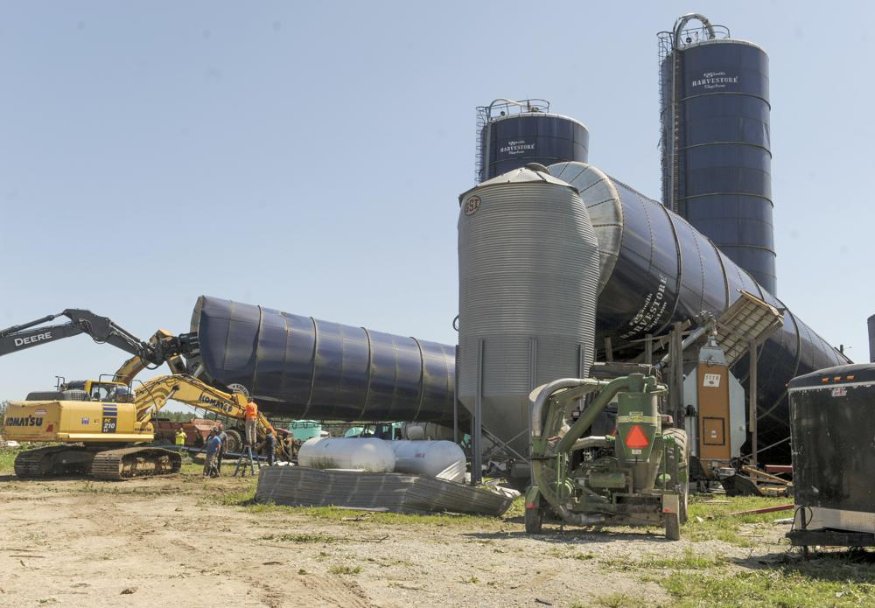
Despite the massive blow Wellacrest Farms experienced, the Eachus family feels blessed. With three generations on the farm today, Marianne says she hopes that her grandchildren will want to continue the family farm someday.
“The farm is in better shape than it has been in probably the last 10 years,” she says.
“Everything the color blue on our farm is a sign of rebuilding that happened from the farm. Which was a lot,” she shares.
Wellacrest Farms’ feed company offered a 0%, $100,000 loan, to serve as a line of credit, to begin the rebuilding process. Factor in the GoFundMe, and all the cash donations, and the Eachus family feels blessed for the outpouring of support.
Marianne says it’s hard for her to watch the news on television with all the devastation that Hurricane Ivan brought to Florida this fall.
“It’s just too hard,” she says. “It brings back all that we have gone through.”
Her 5-year-old grandson gets hysterical when weather alerts come across the television.
“He’s a tough guy, but as soon as it starts to get a dark cloud, he begins to cry,” she says.
The tornado has affected the entire family, but more than anything, it has made them feel grateful.
“I wish I could write a thank you note to every single person who offered help in any shape or form,” Marianne says.
Letters from California to Florida and everywhere in-between came, but one letter that came from an older gentleman in a nursing home still sticks with Marianne a year later.
“He wrote me a beautiful letter, saying his grandparents had a dairy farm when he was younger and they had to take the milk and put it in the cans and take it to the dump station with his father,” she said crying. “He sent me $20 and that was what meant the most to me.”
Resilient, a year later the Eachus family, their herd of cows and their employees all have been through so much. They’re thankful for the outpouring of support from their community to help them rebuild. Without them, Marianne says she doesn’t know how her family would have rebuilt.
“Everyone helping us out gave us strength to take it one day at a time,” Marianne says.







